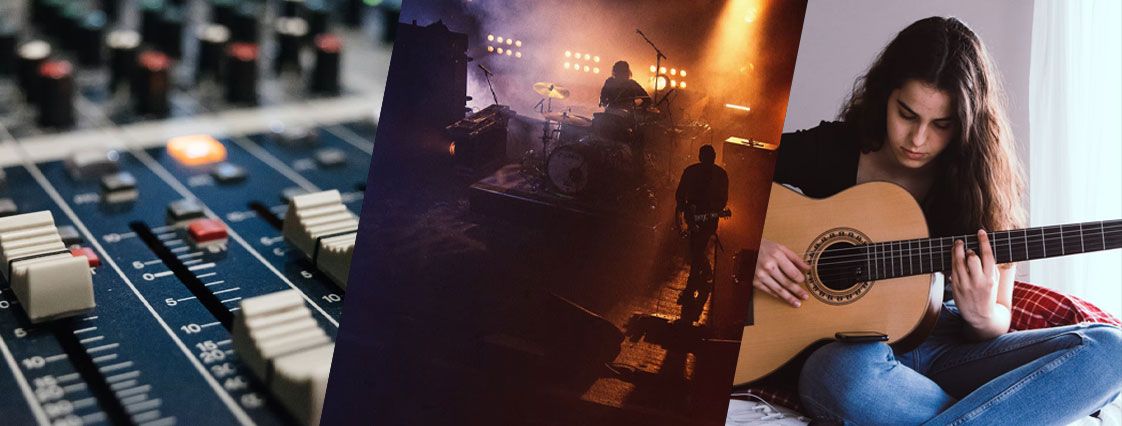There’s no way around it. Learning to play the guitar is both an incredibly exciting and overwhelming task. Many budding guitar players start out motivated only to get frustrated, not knowing how, when, or what to learn. The key to success? Creating a result-oriented guitar practice routine that’s based on science and matches your lifestyle and your goals.
Especially as a beginner, the way you schedule your guitar practice routine will affect how fast and efficiently you improve. A smart routine should be exciting, focused, goal-oriented, creative, but most of all: effective. This means crafting your guitar routine according to the science of habit-forming, goal setting, novelty and rewards. Here’s how to create your guitar practice routine that actually works.
Step 1: Set clear and realistic goals

Dreaming of becoming the best guitar player in the world is fine — but it shouldn’t be the foundation of your guitar practice routine. Why? Because it’s too vague. Setting clear, realistic goals is the first step to creating an efficient guitar practice schedule. By giving yourself such a large, undefined goal, it’s easy to feel lost, overwhelmed, and disheartened as you try to achieve it.
Instead, choose more actionable, attainable goals such as learning enough to play in a band, or grasping the basics of how songs are structured so you can start creating your own. Once you achieve your goal, it’s time to create your next one. Success is a step-by-step process. Be patient, and it’ll pay off!
How to choose an effective guitar goal
George T. Doran states that effective goals have five essential features. They must be SMART:
- S - Specific. Make sure your goal is laser-focused. For example, identify a particular guitar technique that you want to develop and focus exclusively on that.
- M - Measurable: Make sure you can benchmark your progress. This could mean using the number of scales you’ve mastered or new chord positions you’ve learned to gauge how well you’re advancing.
- A - Attainable/Achievable: To prevent yourself from becoming frustrated and disheartened it’s essential that your goal is achievable within your allotted time frame.
- R - Realistic: Sometimes the truth hurts, but it’s important to accept it if you want to make real progress. You’re not going to be Jimi Hendrix in the next 6 months, but you might be able to learn the chords to Foxy Lady or Hey Joe in that time!
- T - Time-bound: Being realistic about your guitar-playing goals also means taking time into consideration.Giving yourself a fixed time frame helps keep you focused and makes it more likely that you’ll reach your goal.
Listen to Steve Vai’s solid guitar practice advice
Steve simplifies the somewhat daunting task of learning guitar by highlighting the importance of setting realistic goals, creating time, and most importantly, enjoying the process. Here’s a summary of his advice for beginner guitar players:
- Get clear about your goals. Create a vivid and exciting picture in your mind of where you want to be and let that guide you. This will serve as a form of motivation when things get tough.
- Forget about your weaknesses. Focus on and develop your strengths instead.
- Believe in yourself. The only thing between you and achieving your goals is you.
Step 2: Use science to boost your guitar practice routine

We’re creatures of habit by nature. Humans are built to repeat predictable patterns of behavior because we register predictability as being safe. But, we can hack this quirk of our psychology to create a guitar practice routine that actually works.
James Clear’s research on habit-forming is essential. Clear introduced the concept of the ‘atomic habit’ which suggests that habits are formed as a series of little steps as opposed to giant leaps. So, it’s more important to practice little and often (i.e. 5 minutes a day, every day) than it is to practice a lot in one go (i.e. 2 hours once a week). It’s only by doing something regularly that it becomes a habit. So, it’s only by making your guitar practice routine habitual that you’ll make lasting progress.
How to create a habitual guitar practice routine
Here’s how to make your guitar practice routine habitual, according to Clear’s atomic habit method:
- Start with the easiest, smallest version of habit you’re trying to cultivate. So, for guitar, give yourself an incredibly achievable goal, i.e. practice for 2 minutes a day.
- Overtime, gradually increase the time spent on this habit. However, don’t make any huge leaps. Rather that jumping from 2 to 10 minutes every day, jump from 2 to 3.
- Even though you’re gradually increasing the length of your routine, it must remain easy to achieve. If it starts to get complicated, you must be able to break it down into tiny bite-sized sections to avoid becoming frustrated and breaking your habit.
How often should you practice guitar to get good?
Thanks to the science of atomic habits, the key to a successful guitar practice routine is the regularity of playing as opposed to playing for longer once a week. So, to see significant improvement in your guitar-playing, we recommend playing for 15 minutes a day, every day.
Not only is this achievable and, therefore, more likely to become habitual, practicing for 15 minutes a day adds up to 5475 minutes a year, which is a substantial amount. We’ve structured our Learn Path into bite-sized, step-by-step 15-minute lessons. If you practice with us every day, in 2-3 months, you’ll go from learning the basics, to learning how to write your own music.
Step 3: Keep your guitar practice routine fresh

To create a guitar practice schedule that you keep coming back to, it’s got to contain variety otherwise you’ll lose interest—fast. Humans thrive on novelty. When we experience something novel, our brains release a rush of dopamine which stimulates our memory. That’s why it’s easy to recall unusual days from school or work, but not so much the ordinary days.
So, as it’s easier to remember things that are new to you, you should make sure your regular guitar practice includes novelty alongside your more repetitive practice tasks. For example, we structured our Learn Path to target different areas of practice each day to create a fresh and balanced guitar practice routine. These include lessons focused purely on rhythm, chords, scales, composition, improvisation, melodies, riffs, and strumming. You should be sure to include a similar level of variety in your own practice routine.
Step 4: Celebrate your wins

When you’re learning something new, it’s always much easier to compare yourself to where you want to be, rather than from where you’ve come. That’s a sure-fire way to feel demotivated and abandon your guitar practice. Instead, make sure to celebrate your wins. That means keeping track of your progress and if nothing else, celebrating the fact that you’re showing up every day to play guitar—even if it doesn’t feel like you’re making much progress.
Developing any skill is all about the long-game. Like most things in life, there’s no shortcut to becoming a skilled guitarist, but if you can enjoy the ride, and acknowledge how far you’ve come, your passion for learning will only grow. This, in turn, will make your a more committed and an all-round better guitar player.
Your beginner guitar practice routine
So, taking all of the above into consideration, your guitar practice routine that will actually work should look like this:
- Your routine should be goal-oriented. While your goals should be realistic, they should help you to keep playing even when times get tough and you hit a rough patch in your practice.
- Practice for 15 minutes a day, everyday. Remember that consistency is the key. As you progress, you can even begin to increase the length of your practice sessions.
- Keep your guitar practice routine fresh by adding variety. This makes it more likely that you’ll continue to show up for practice every day.
- Celebrate your wins, no matter how small. Real progress comes with regular practice and as guitar players all over the world know, the more you practice, the more enjoyable playing guitar becomes!
If you want to take your guitar playing to the next level, try Fretello for free. We'll set you up with a guitar practice routine that sticks. Plus, you’ll learn the basics and beyond using a step-by-step Learn Path and improve quickly thanks to the app's real-time feedback.